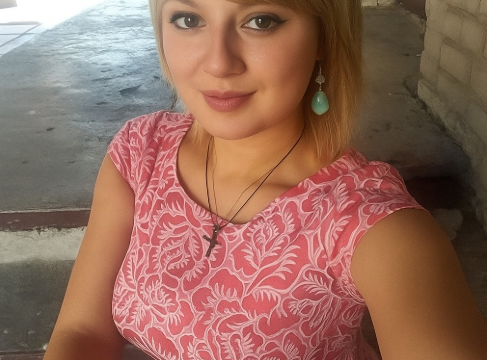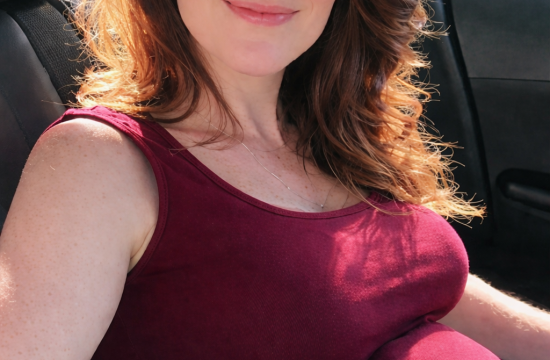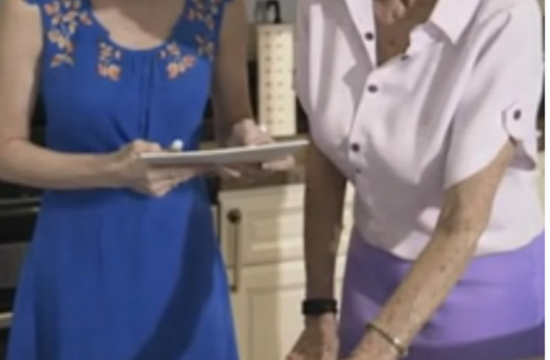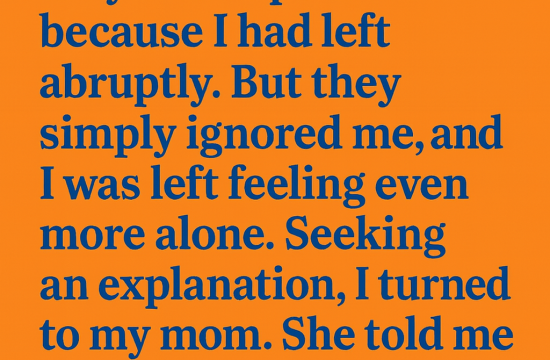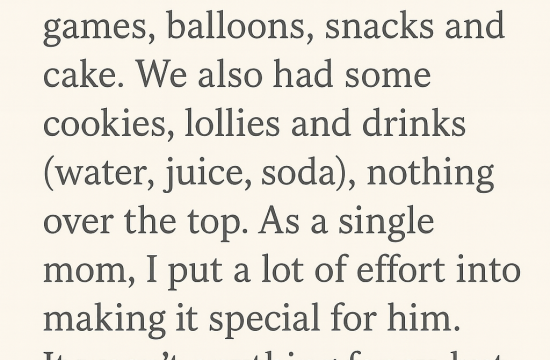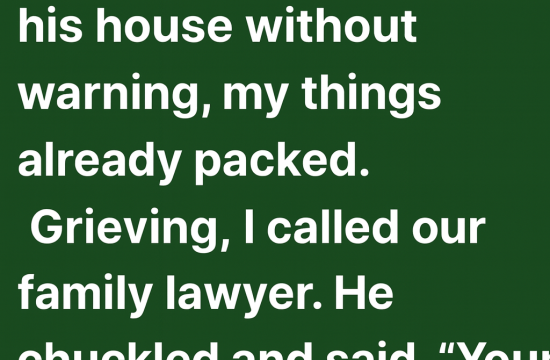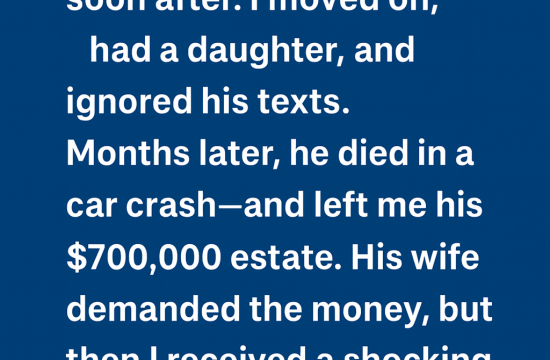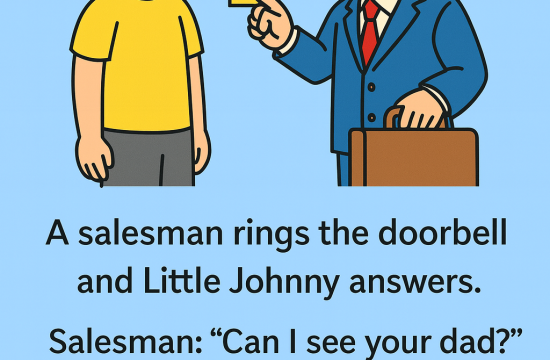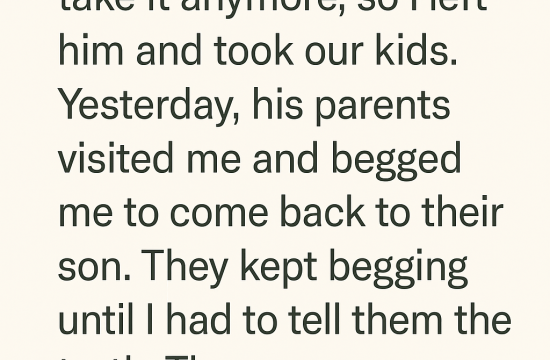He always insisted on tucking me in at night, which I thought was cute—until I noticed how particular he was about the blankets. They had to be perfectly tight. One night, I woke up gasping for air, only to realize he had tied the corners of the blanket to the bedframe.
At first, I laughed it off. “You’re such a weirdo,” I told him the next morning, giving him a playful shove. He chuckled, saying something about wanting me to feel “safe and secure.”
But the next night, it happened again. This time, the blanket was tucked so tightly I couldn’t move my legs. I had to shimmy out from under it like a caterpillar escaping a cocoon. Again, he just smiled when I confronted him. “I just want you to sleep well, baby.”
He was sweet in so many ways. He made me tea every night. He knew how I liked my toast, even remembered I hated pulp in orange juice. But slowly, those little quirks turned into rules.
No shoes in the house—fine, that made sense.
Then: no speaking during meals.
No leaving the lights on for more than two minutes in an empty room.
Absolutely no using the guest bathroom.
He didn’t yell. He never hit me. That’s what made it harder to see.
I met Radu when I was working at the bookstore downtown. He came in one rainy Tuesday looking for a book on Romanian folktales. We got to talking. He was soft-spoken, kind. Very proper. By the end of the week, he had left flowers on the counter with a note: “For the girl who knows stories—maybe now you’ll be part of mine.”
I fell fast. Faster than I’d like to admit.
He had this quiet intensity, like everything he said mattered. When he talked about his childhood, it was like I could see the hills and cobblestone streets he grew up on. His mother died when he was a teenager, and he’d cared for his younger sister after that. There was pain in his voice when he mentioned her—I never pushed.
He moved in after three months. I thought it was romantic. He said he couldn’t sleep without me. That the silence when he was alone echoed too loud. I believed him.
The blanket thing got worse.
After the third time, I stopped letting him tuck me in. But he’d still sneak in after I fell asleep, adjusting the corners like a nurse prepping for inspection. I pretended not to notice. I wanted peace. He hadn’t done anything bad, right?
Then I started finding my things moved.
My favorite sweater, hidden behind books on the top shelf.
My phone, tucked under the mattress.
When I confronted him, he always had a reason: “I thought it was dirty.” Or “You left it out. I was helping.”
One night, I got up to get water and found him sitting on the hallway floor. Just… sitting. Staring at the wall.
When I asked what he was doing, he looked at me blankly and said, “Making sure everything stays the same.”
That’s when I started keeping a journal.
I wrote down every strange thing.
The time he turned all the mirrors to face the wall.
The time he taped the window shut in the living room.
The morning I woke up and all the kitchen knives were gone.
I told myself I was being paranoid. Maybe he was just… different.
Then he lost his job.
He stayed home all day, reorganizing the apartment. He made charts. Lists. Schedules.
I wasn’t allowed to leave my coffee mug in the sink anymore.
He’d text me during work to ask if I remembered to lock the door.
If I didn’t reply within five minutes, I’d get twenty more messages.
My friends started asking questions. I brushed them off.
“He’s just protective,” I’d say. “He means well.”
But the truth? I was scared to make him angry.
Not because I thought he’d hit me—he never raised his voice.
But there was something in his silence, in the way he’d look at me with wide, disappointed eyes, that made me feel like a child being punished.
Then came the bird.
I came home early from work and found a dead bird on the balcony. Its neck was twisted, wings splayed out like someone had posed it.
Radu stood behind me, staring at it with no emotion.
I asked him what happened.
He said, “It flew into the window.”
But there was no mark on the glass. No feathers stuck. Just the bird, perfectly placed.
That night, I didn’t sleep.
The next day, I called my sister. Told her something was off.
She didn’t hesitate. “Leave. Come stay with me. Just go.”
But I didn’t. Not yet.
Part of me still wanted to believe it was all in my head. That maybe I was overreacting. That maybe I was just… tired.
People talk about abuse like it’s obvious. It’s not.
It creeps up like mold in corners you forget to clean.
Then one day, I came home—and my journal was gone.
I knew exactly where I had hidden it. Taped to the underside of the drawer in my bedside table. Gone.
I looked at him. “Where is it?”
He shrugged. “You shouldn’t write lies about the people you love.”
That night, I packed a bag while he showered. My heart was hammering so loud I was sure he could hear it through the walls.
I got as far as the front door before I heard his voice behind me. Calm. Quiet.
“Where are you going, love?”
I turned. “I’m going to my sister’s. Just for a few days.”
He stepped closer. “Did I do something wrong?”
I didn’t answer. I couldn’t.
He took the bag from my hands. “Stay. I’ll change. I’ll try harder.”
I looked at him—really looked. His eyes were hollow. Tired. But he believed what he was saying.
And I realized: he didn’t see himself as the problem.
In his mind, he was protecting me. From the world. From myself.
That kind of belief? You can’t change it. Not unless they want to.
So I stayed that night. One last night.
I didn’t sleep.
And when the sun rose, I walked out with nothing but my keys and phone.
I stayed at my sister’s for three months. Changed my number. Got a restraining order.
He tried to contact me once—through a mutual friend.
Said he missed me.
Said he kept the bed just the way I left it.
I told the friend not to respond.
Then came the twist.
About a year later, I got a letter in the mail. No return address.
Inside was a photo.
It was the bird. The same one from the balcony. Only now it was painted—in oil. Framed.
Underneath, in his handwriting: “I was just trying to fix what was broken.”
I didn’t throw it away. Not because I missed him—but because it reminded me how easily love can twist into something else.
Two years passed.
I started seeing someone new. Kind. Respectful. Normal.
His name’s Matei. He doesn’t tuck me in at night. Doesn’t care how I fold towels. He listens. Really listens.
The first time I told him about Radu, he didn’t flinch.
He just said, “That sounds terrifying. I’m glad you got out.”
No judgment. No pity. Just… understanding.
The crazy thing?
A few months into dating Matei, we went to a small gallery in town. One room was dedicated to emerging artists. And on the far wall was a style I recognized.
Brushstrokes sharp like glass.
It was Radu’s work.
Same color palette. Same unsettling symmetry. And in the corner: R.L.
Next to it, a placard:
“R.L. is a self-taught painter who uses visual metaphor to explore themes of control, grief, and lost connection. His work has drawn interest for its haunting emotional weight.”
I wanted to feel angry. Or scared.
But I didn’t.
All I felt was… sadness.
Because maybe, in his own way, he was still trying to process it. Still trying to fix what he broke. Still trying to control what always slipped through his fingers.
That night, I went home and pulled the bird painting from the drawer.
I sat with it for a long time.
Then I tossed it.
Not in anger. Just… release.
We carry so much we don’t need. Old guilt. Old pain. Things we once mistook for love.
But healing isn’t about erasing the past.
It’s about facing it—and choosing different next time.
Here’s the thing: people like Radu don’t always look dangerous.
They might bring you flowers. Make you tea.
Call you “love” with the softest voice.
But love without freedom isn’t love.
It’s fear dressed in kindness.
And sometimes the bravest thing you’ll ever do is walk away—
Not because you hate them,
But because you finally remembered how to love yourself more.
If you’ve ever been there, or you’re there now… know this:
You deserve softness without strings.
Security without silence.
And love that doesn’t make you smaller, just to fit into someone else’s idea of perfect.


